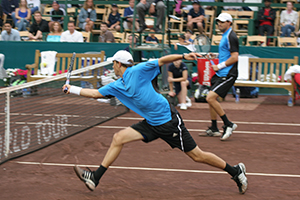Source: AdvantageUSPTA.com
|
The chemistry between good doubles partners, such as the Bryan Brothers, looks like magic from a distance.
|
by Mark Centrella, USPTA, and Dr. Karissa Thacker
The chemistry between good doubles partners looks like magic from a distance. Just think about the Bryan Brothers, Woodford and Woodbridge, or Navratilova and Shriver. The chemistry factor seems quite mysterious when it is really working. It can also get really ugly when it is not working. Doubles tennis is a team sport. As a team sport, interpersonal behavior (or the ways in which we interact with our partners) is a key factor in creating chemistry that works or does not work. Most club players know basic things to do like call for the ball and yell “switch.” Saying “I’ve got it” or “switch” are examples of basic positive interpersonal communication that is important on the tennis court. But how many of us know what NOT to do? How many of us are aware of destructive interpersonal behaviors that we need to avoid?
There are several negative interpersonal behaviors that lose tennis matches and derail strong technical partnerships that should work. The three most deadly doubles behaviors are:
- Blaming
- Bossing
- Bailing
Blaming involves either verbally or in your own mind assigning responsibility to your partner for mistakes as you go through the match. There are several problems with this. First, your head is in the past and not in the current point. Second, your partner is likely to feel bad and focus on how difficult it is to play with you versus figuring out how to win the match. The most obvious of all is that you are likely causing your partner’s confidence to go down and not up, which is not good for the team. How does this play out? Blaming plays out most often nonverbally. Typical behaviors include eye rolling, loud sighing, or not talking between points or during change overs.
Bossing – Telling your partner what to do and what not to do is another common counterproductive behavior. It is different from joint strategizing. Bossing likely negatively impacts your team because you are focusing on critiquing your partner instead of figuring out sound tactics to deal with the situation on the court. Of most importance, bossing is likely causing your partner to be angry. Adults do not respond well to being told what to do in general unless by a qualified coach. Qualified coaches have a skill set that allows them to understand players as individuals and tailor instruction to that player. The role of partner is not the same as the role of coach. I, Mark, am a tennis coach. However, when I am playing a match with a doubles partner, my job is not to coach my partner. I make it a point to refrain from offering technical critique and keep my commentary focused on tactics and strategy.
Bailing, or quitting and accepting defeat, is the third deadly doubles behavior. You just stop putting in 100 percent effort. You stop thinking about how to change the momentum and instead accept your defeat passively. While your partner is working hard and thinking hard, you have just given up. The most common examples of bailing include not being in position, not moving well, not moving much, or being on your heels instead of toes. This can really infuriate a partner who is still working and gutting it out. It is also the most subtle of the three to detect on the tennis court.
Given enough stress and pressure, all players demonstrate negative interpersonal behaviors like blaming, bossing and bailing to some degree. With any interpersonal behavioral challenge, the hardest part is to understand how one’s behavior is impacting the other person. It is not easy for doubles partners to tell each other to stop blaming or bossing. Players are not likely to get that kind of direct, honest feedback from each other. However, if coaches can make their players aware of these three types of common behaviors and encourage each player to make an honest self-diagnosis, negative tendencies can be identified and genuinely confronted. It is through self-discovery that players will be more willing to confront their negative habits.
From Wilmington, Del., Dr. Karissa Thacker is a widely respected management psychologist who has served as a consultant in more than 200 Fortune 500 companies including UPS, Best Buy and AT&T. Her specialty is executive coaching with a focus on increased performance at work in combination with increased individual satisfaction at work.
Mark Centrella is a USPTA Master Professional as well as the Head Tester for Middle States. He is the director of racquet sports at the Greenville Country Club in Wilmington, Del. He is also the creator of the doubles instructional video “Winning Doubles with Mark.”
Original Article at: http://www.addvantageuspta.com/default.aspx/act/newsletter.aspx/category/ADDvantage/MenuGroup/Ads/NewsLetterID/1535.htm

